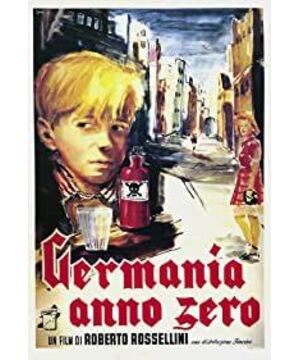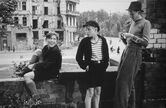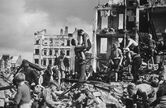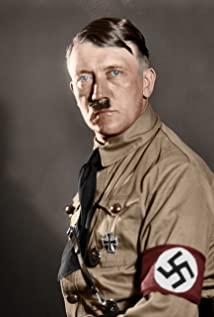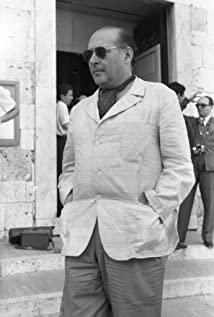War is gone, and the wounds of war to people and life are so easy to leave. Robert Rossellini’s "Germany Year Zero" is one of the representative works of neorealism. It is one of Rossellini’s "post-war trilogy" (the other two are "Rome: Undefended City" and "War of War". "), "Germany Zero Year" further reveals the cruelty of war through the story of a child "Father Shi". The film expresses people’s aversion to war through reflections on the disasters brought to many countries after the Second World War. Some of the long shots are meaningful. Through those haunting images and unforgettable performances by ordinary citizens (non-professional actors), Rossellini demonstrated the harm caused by fascism's brainwashing of an entire generation. The film won the 1948 Locarno International Film Festival Best Drama Award.
[Comment]
Since ancient times, the assassin has
only captured 6
haunting pictures and the unforgettable performances of ordinary citizens (non-professional actors). Through this film, director Rossellini shows how fascism has brainwashed an entire generation of people. harm.
As the photo shows, this is Germany, Berlin after World War II.
Everything has to start again, so this is Germany's zero year.
Year zero is the starting point of a new era, and it should be full of hope. But Edmundo certainly opposed it. The ruins he saw were all shaky and disorganized. Usually the same happens on construction sites, but there will be scaffolding on it. Window openings without scaffolding can only be used to outline the ruins.
There was no one in the ruins, and Edmundo walked in, feeling that he had become a part of it. Those big walls, standing there, were ordinary, but when they fell, they were thrilling. Therefore, as a wall, the collapse is its most glorious moment.
There are many children who are like Edmundo. When I saw this scene, I immediately thought of Mouchette, Mouchette of Robert Bresson, just because it was a girl.
The children at that time knew turbulence and violence the most. They don't even understand who abandoned themselves. Adults do not know this question. Edmundo's father is sick in bed, he considers himself a burden, and is looking forward to the world abandon him.
Edmundo's brother didn't always lie on the ground like this, but once he did that, I thought of China's old society. Originally, the Italian neo-realism is similar to the Chinese.
Edmundo's brother became a specimen. He was lying on the ground, there was the lowest part of the room, and he was also the lowest in the family, so low that he didn't even have an identity. He was a Nazi soldier before the defeat, but now he can only hide at home.
Surviving on the ground is the way for my brother to survive. It can't be lower, because below the ground is the tomb.
No one in the family knew what Edmundo was doing. In fact, he was doing illegal business with his former teacher. Hitler's speech echoed in the ruins, and reactionary passion was the basis of the transaction. Selling these things is of course forbidden. Even more unfortunately, the teacher also worked with him to gain a living power from the inspiring Nazi propaganda.
The 12-year-old became steady and stoic. He could already poison his father's tea leaves calmly, which made him fulfill his wish. In addition to this incident, Edmundo is still very responsible, even if the children on the street don't play with him, he is not angry.
When he came to this abandoned building, Edmundo looked out from various windows, admiring all kinds of pedestrians and street scenes. He also threw a stone, watching it hit the opposite wall and fell, echoing crisply. Muschett is more fierce than him, because she throws stones at her little friend.
It is good to fall with a crackling sound like that stone, as brilliant as the collapse of a wall. Falling and being watched is a perfect end, but you must pay attention to some details and not be too embarrassed. In 1967, Bresson let Muschett roll from the grass slope into the water, creating a new model of suicide by throwing himself into the river. In 1947, Rossellini also urged his Edmundo to choose the most suitable position, and then fell coldly.
Falling into the water and falling from a building, Muschett’s suicide and Edmundo’s suicide were unexpectedly silent.
History escape the burden of heavier
Ding Gang
When Kayla jumped downstairs, her heart must have been filled with despair. This 12-year-old German child jumped from a dilapidated tall building after poisoning his father on a sunny summer day in 1947. This is the final shot of the movie "Germany Year Zero".
I think of this movie I watched many years ago because I read a message from a Japanese netizen on the Internet. Not long ago, the author once wrote a small essay "What kind of reflection is lacking in Japan" (April 11th edition). The article was translated into Japanese and published on the Japanese version of People's Daily Online. There were hundreds of posts by Japanese netizens. Lots of articles. One of them wrote, “The author’s opinion is hard to resonate among Japanese young people. I am 31 years old. Except for textbooks in elementary and junior high school, all my education comes from teachers of social sciences. Regarding the Nanjing Massacre Issues such as Japan, labor, comfort women, etc., are just to teach you that there is such a thing in history without emotion, without involving right and wrong. But in the feelings of the Japanese, the historical education of World War II only has the concept of an atomic bomb-affected country. Based on this This kind of unilateral understanding cannot be communicated, and there will be no reflection and reconciliation. Especially now that the old and new generations are changing, the problem is more complicated."
Chinese media have reported a lot of Japanese right-wing tampering with history textbooks. But this netizen said that "the old and new generations are changing, and the problems are more complicated", which obviously involves the issue of the responsibility of historical education. In the 60 years since the beginning of World War II, there should be at least three generations. The most critical generation is the "middle generation" like Kayla. "Germany Year Zero" was taken in 1947. The success of this film lies in its true representation of the cruel reality faced by the "middle generation". This film directed by the neo-realist master Rossellini is completely shot in real scenes. The Berlin ruins in the film are connected to the ruins, and 3.5 million people live in poverty and hunger. Kayla’s family of four, his father was sick and bedridden, her brother was reluctant to surrender because he was a Nazi, and hid at home, while her sister became a prostitute. Kayla looked for a living everywhere in order to support her family, and even worked as a gravedigger. A teacher who sold fascist propaganda underground asked Kayla to sell Hitler's speech recordings, and Kayla unknowingly accepted the fascination of Nazi ideology. When his father persuaded his brother to surrender, he actually poisoned his father. After seeing his father's body being pulled away by the car, he closed his eyes and committed suicide by jumping off the building.
"Germany Zero Year" can be regarded as one of the earliest literary works involving reflection after the war, and this film is still often mentioned today. The latest review I saw on the Internet said that Keira’s tragedy raised a string of questions: What makes a child so crazy? The Germans are still not part of the human race? Is fascism just a moral error? This is how reflection begins.
The title itself symbolizes the restart of the German nation under the pressure of reality and spirit. Keira chose to commit suicide, but more of his peers, like the current Prime Minister Schroeder and the former Prime Minister Cole, bravely assumed the responsibility of history. When the parents gradually faded out of history, this generation educates their descendants with their words and deeds, and shows to Europe and the world that Keira’s tragedy will never repeat itself. They got out of the psychological shadow that Kayla could not get out of. With the reflection of this generation, Germany will become the core driving force of European integration, and there will be more Poles, French, Dutch...willing to "collectively bear the common memory" with them and their next generation. .
The history of Germany after the war tells us that "middle generations" like Schroeder paid a heavy price for the guilt of their fathers, but they also used their sense of responsibility to educate their younger generations. Compared with Germany, we will have a deeper understanding of Japan's "middle generation". Now the members of the Koizumi cabinet were mostly born around the end of the war, with an average age of nearly 57 years old, but unlike Germans of the same generation, many of them chose to evade in the face of historical responsibilities. It is precisely because of their evasion that the new generation of Japanese talents have to face a heavier historical burden and will increasingly encounter the "more complicated problems" mentioned by the Japanese netizen. All this has aggravated the worries of the Asian people: Will Keira’s tragedy repeat itself in Japan?
View more about Germany Year Zero reviews


